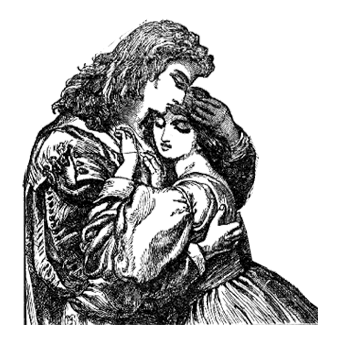For now the hour was arrived at which the friar had promised that she should awake; and he, having learned that his letters which he had sent to Mantua, by some unlucky detention of the messenger, had never reached Romeo, came himself, provided with a pickax and lantern, to deliver the lady from her confinement; but he was surprised to find a light already burning in the Capulets’ monument, and to see swords and blood near it, and Romeo and Paris lying breathless by the monument,
Before he could entertain a conjecture, to imagine how these fatal accidents had fallen out, Juliet awoke out of her trance, and, seeing the friar near her, she remembered the place where she was, and the occasion of her being there, and asked for Romeo, but the friar, hearing a noise, bade her come out of that place of death and of unnatural sleep, for a greater power than they could contradict had thwarted their intents; and, being frightened by the noise of people coming, he fled. But when Juliet saw the cup closed in her true love’s hands, she guessed that poison had been the cause of his end, and she would have swallowed the dregs if any had been left, and she kissed his still warm lips to try if any poison yet did hang upon them; then hearing a nearer noise of people coming, she quickly unsheathed a dagger which she wore, and, stabbing herself, died by her true Romeo’s side.
The watch by this time had come up to the place. A page belonging to Count Paris, who had witnessed the fight between his master and Romeo, had given the alarm, which had spread among the citizens, who went up and down the streets of Verona confusedly exclaiming, “A Paris! a Romeo! a Juliet!” as the rumor had imperfectly reached them, till the uproar brought Lord Montague and Lord Capulet out of their beds, with the prince, to inquire into the causes of the disturbance. The friar had been apprehended by some of the watch, coming from the churchyard, trembling, sighing, and weeping in a suspicious manner. A great multitude being assembled at the Capulets’ monument, the friar was demanded by the prince to deliver what he knew of these strange and disastrous accidents.
And there, in the presence of the old Lords Montague and Capulet, he faithfully related the story of their children’s fatal love, the part he took in promoting their marriage, in the hope in that union to end the long quarrels between their families; how Romeo, there dead, was husband to Juliet, and Juliet, there dead, was Romeo’s faithful wife; how, before he could find a fit opportunity to divulge their marriage, another match was projected for Juliet, who, to avoid the crime of a second marriage, swallowed the sleeping-draught (as he advised), and all thought her dead; how meantime he wrote to Romeo to come and take her thence when the force of the potion should cease, and by what unfortunate miscarriage of the messenger the letters never reached Romeo. Further than this the friar could not follow the story, nor knew more than that, coming himself to deliver Juliet from that place of death, he found the Count Paris and Romeo slain. The remainder of the transactions was supplied by the narration of the page who had seen Paris and Romeo fight, and by the servant who came with Romeo from Verona, to whom this faithful lover had given letters to be delivered to his father in the event of his death, which made good the friar’s words, confessing his marriage with Juliet, imploring the forgiveness of his parents, acknowledging the buying of the poison of the poor apothecary and his intent in coming to the monument to die and lie with Juliet. All these circumstances agreed together to clear the friar from any hand he could be supposed to have in these complicated slaughters, further than as the unintended consequences of his own well-meant, yet too artificial and subtle contrivances.
And the prince, turning to these old lords, Montague and Capulet, rebuked them for their brutal and irrational enmities, and showed them what a scourge Heaven had laid upon such offenses, that it had found means even through the love of their children to punish their unnatural hate. And these old rivals, no longer enemies, agreed to bury their long strife in their children’s graves; and Lord Capulet requested Lord Montague to give him his hand, calling him by the name of brother, as if in acknowledgment of the union of their families by the marriage of the young Capulet and Montague; and saying that Lord Montague’s hand (in token of reconcilement) was all he demanded for his daughter’s jointure. But Lord Montague said he would give him more, for he would raise her a statue of pure gold that, while Verona kept its name, no figure should be so esteemed for its richness and workmanship as that of the true and faithful Juliet. And Lord Capulet in return said that he would raise another statue to Romeo. So did these poor old lords, when it was too late, strive to outgo each other in mutual courtesies; while so deadly had been their rage and enmity in past times that nothing but the fearful overthrow of their children (poor sacrifices to their quarrels and dissensions) could remove the rooted hates and jealousies of the noble families.




